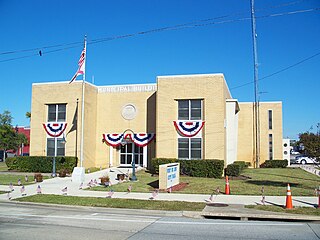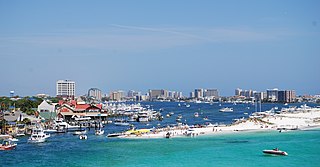
Bay County is a county on the Emerald Coast in Northwest Florida. As of the 2020 census, the population was 175,216. Its county seat is Panama City.

Callaway is a city in Bay County, Florida, United States, and is a suburb of Panama City. The population was 13,045 at the 2020 census, down from 14,405 at the 2010 census. It is part of the Panama City–Panama City Beach, Florida Metropolitan Statistical Area.

Mexico Beach is a city in Bay County, Florida, United States. It is located 25 miles (40 km) southeast of Panama City on the Florida Panhandle. It is part of the Panama City-Panama City Beach, Florida Metropolitan Statistical Area in North Florida. The population was 916 at the 2020 census, down from 1,072 at the 2010 census.

Panama City is a city in and the county seat of Bay County, Florida, United States. Located along U.S. Highway 98 (US 98), it is the largest city between Tallahassee and Pensacola. It is also the most populated city and a principal city of the Panama City–Panama City Beach, Florida Metropolitan Statistical Area. As of the 2020 census, the population was 32,939, down from the figure of 36,484 at the 2010 census.

Panama City Beach is a resort town in Bay County, Florida, United States, on the Gulf of Mexico coast. It had a population of 18,094 at the 2020 census, up from 12,018 in 2010. It is a principal city in the Panama City—Panama City Beach, Florida Metropolitan Statistical Area. Panama City Beach is often mistakenly referred to as "Panama City". Panama City Beach's slogan is "The World's Most Beautiful Beaches" due to the unique, sugar-white sandy beaches of northwest Florida.
Parker is a city in Bay County, Florida, United States. It is part of the Panama City–Panama City Beach, Florida Metropolitan Statistical Area. As of the 2020 US census, it had a population of 4,010, down from 4,317 at the 2010 census.
Springfield is a city in Bay County, Florida, United States, east of Panama City. It is part of the Panama City–Panama City Beach, Florida Metropolitan Statistical Area. Springfield was incorporated on February 12, 1935. The population was 8,075 at the 2020 census, down from 8,903 at the 2010 census.

Everglades City is a city in Collier County, Florida, United States, of which it was once the county seat. It is part of the Naples–Marco Island Metropolitan Statistical Area, which is included in the Cape Coral-Fort Myers-Naples Combined Statistical Area. The Gulf Coast Visitor Center for Everglades National Park is located in Everglades City. As of the 2020 US census, the population was 352, down from 400 in the 2010 US census.

Moore Haven is a city in, and the county seat of, Glades County, Florida, United States. It is part of the Florida Heartland region. The population was 1,566 at the 2020 census, down from 1,680 at the 2010 census. Moore Haven is located on the southwest shoreline of Lake Okeechobee. It is part of the Clewiston, Florida Micropolitan Statistical Area (μSA).

Port St. Joe is a city and the county seat of Gulf County, Florida. It is located at the intersection of U.S. Highway 98 and State Road 71. As of the 2020 census, the population was 3,357.

Clewiston is a city in Hendry County, Florida, United States. Its location is 80 miles (130 km) northwest of Fort Lauderdale on the Atlantic coastal plain. The population was 7,327 at the 2020 census, up from 7,155 at the 2010 census. It is the principal city in the Clewiston micropolitan area.

Sebastian is a city in Indian River County, Florida, United States at the confluence of the St. Sebastian River and the Indian River. It is two miles away from the Atlantic Ocean. It is the largest city in Indian River County and the biggest population center between Palm Bay and Fort Pierce. The city's economy is heavily reliant on tourism. It has numerous resorts in the local area, such as Disney's Vero Beach Resort. It is very close to many natural and scenic areas like the Pelican Island National Wildlife Refuge, Sebastian Inlet State Park, and St. Sebastian River Preserve State Park.

Cottondale is a city in Jackson County, Florida, United States. It is part of the Florida Panhandle and North Florida. The population was 848 at the 2020 census, down from 933 at the 2010 census.

Destin is a city located in Okaloosa County, Florida, United States. It is a principal city of the Crestview–Fort Walton Beach–Destin, Florida Metropolitan Statistical Area. The population was 13,931 at the 2020 census, up from 12,305 at the 2010 census.

Safety Harbor is a city on the west shore of Tampa Bay in Pinellas County, Florida, United States. It was settled in 1823 and incorporated in 1917. The population was 17,072 at the 2020 census.

Auburndale is a city in Polk County, Florida, United States. It is part of the Lakeland-Winter Haven, Florida Metropolitan Statistical Area. The population was 15,616 at the 2020 census.

Fort Meade is a city in Polk County, Florida, United States. As of 2020, the population recorded by the U.S. Census Bureau is 5,100. It is part of the Lakeland–Winter Haven Metropolitan Statistical Area.

Haines City is a city in Polk County, Florida, United States. Its population was 26,669 at the 2020 census. It is part of the Lakeland–Winter Haven Metropolitan Statistical Area.

Lake Alfred is a city in Polk County, Florida, United States. It is part of the Lakeland–Winter Haven Metropolitan Statistical Area. The population was approximately 6,374 at the 2020 US census.

Interlachen is a town in Putnam County, Florida, United States. It is part of the Palatka, Florida Micropolitan Statistical Area. The population was 1,441 at the 2020 census, up from 1,403 at the 2010 census.






















